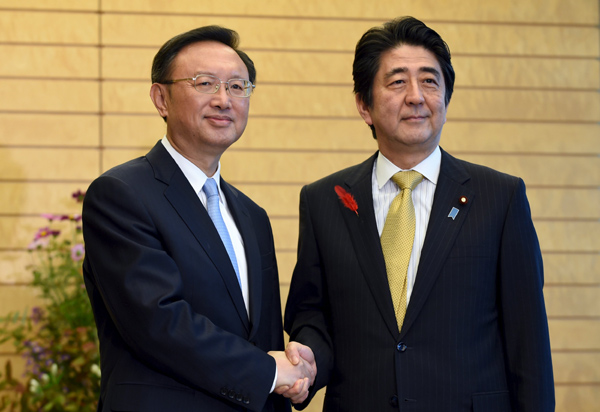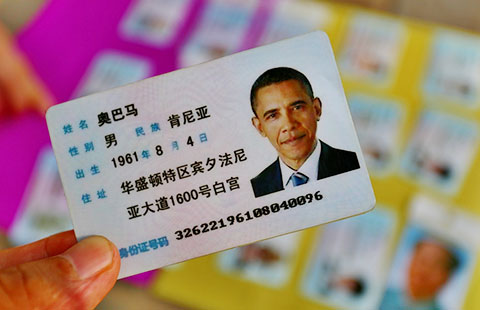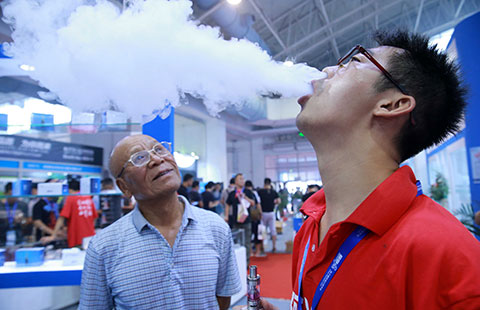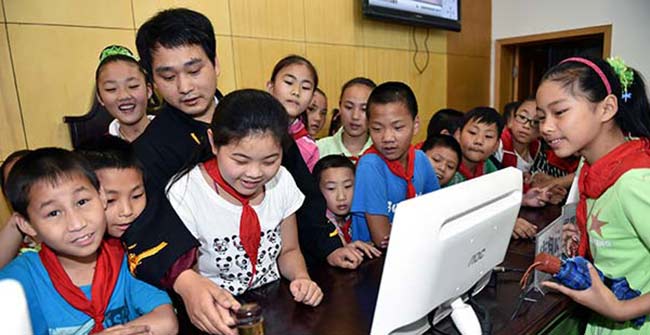Joint efforts 'crucial for key summit'
By CAI HONG/AN BAIJIE/CHEN MENGWEI (China Daily) Updated: 2015-10-15 07:11
 |
|
State Councilor Yang Jiechi (left) and Japanese Prime Minister Shinzo Abe pose for photographers before their talks at Abe's official residence in Tokyo on Wednesday. [Photo/Xinhua] |
Joint efforts will ensure a successful summit between the leaders of China, Japan and the Republic of Korea, State Councilor Yang Jiechi told Japanese Prime Minister Shinzo Abe in Tokyo on Wednesday.
Premier Li Keqiang, ROK President Park Geun-hye and Abe are expected to meet in Seoul late this month or early next.
Yang, who arrived in Tokyo on Tuesday for the second round of the China-Japan High-Level Political Dialogue, said the two countries need to strengthen dialogue and promote pragmatic exchanges and cooperation in all fields.
They should also work together to continue improving relations.
Yang asked Japan to implement the four-point consensus on handling and improving Sino-Japanese relations.
In November, Yang and Japan's National Security Adviser Shotaro Yachi met in Beijing, and both countries issued a "four-point principled consensus" on improving relations.
During talks with Yachi on Tuesday, Yang said China is not happy with Japan's efforts to block China's documents on the Nanjing Massacre listed by the United Nations Educational, Scientific and Cultural Organization's Memory of World registry.
Yang's comments were reported by Kong Xuanyou, director-general of the Department of Asian Affairs at the Chinese Foreign Ministry.
Yang said the situation in the South China Sea is stable and freedom to navigate and fly in the area has never been affected.
During his meeting with Yang, Abe said a stable, friendly relationship between China and Japan-the world's second and third-largest economies-helps to safeguard world peace and boost global economic growth.
This is in the interests of both nations' people and is what the international community hopes for, Abe said.
He said that under the framework of building a strategically beneficial Sino-Japanese relationship, Japan is willing to maintain high-level political dialogue with China. Japan will also handle and control any differences properly.
Ruan Zongze, vice-president of the China Institute of International Studies, said the visit to Japan by Yang, a top Chinese diplomat, shows that Beijing is willing to improve its relationship with Tokyo.
"This indicates that China and Japan are increasing dialogue and that tension is being eased to some extent," Ruan said.
Yang Bojiang, deputy director of the Institute of Japan Studies under the Chinese Academy of Social Sciences, said two elements-cooperation and confrontation-are developing at the same time in Sino-Japanese relations.
"The contradiction will not be resolved in one go. But this should not necessarily mean that efforts to seek agreements through negotiations are abandoned," Yang Bojiang said.
"China and Japan are interdependent economically. Abe has made it clear that he wants to maintain economic cooperation to get a cut from the still fast-growing Chinese economy."
Natsuo Yamaguchi, head of Japan's Komeito Party, a coalition partner of the ruling Liberal Democratic Party, is visiting Beijing with a letter from Abe to President Xi Jinping. The contents remain unclear.
Yamaguchi, who is attending the Asian Political Parties' Special Conference on the Silk Road, said the development of ties has not been smooth, but there is momentum to improve the relationship and the two countries should continue this momentum.
"We should create conditions and the atmosphere for a meeting between the top leaders of Japan, China and South Korea," he said, adding that the three countries should improve cooperation in areas such as infrastructure, finance and energy.
Gao Hong, deputy director of the Institute of Japan Studies at the Chinese Academy of Social Sciences, said Yamaguchi's visit has sent a positive signal to the international community.
- China, Japan, ROK to hold fresh round of FTZ talks in December
- Beijing supports friendly China-Japan exchanges
- The 6th ASEAN-China-Japan-Korea Strategic Roundtable on Food Security Cooperation held in Nanning
- China, Japan, ROK cooperate in new demonstration base
- China-Japan-South Korea Cultural Exchange Exchange Forum and Think Tank Net held in Jilin
- 140b yuan agreed for rural Net upgrading
- Taiwan flight-transfer talks continue
- China vows to increase support for refugees
- Scientists sink teeth into history of humans in Asia
- Official urges right path for mainland-Taiwan relations development
- Former vice police chief on trial for bribery
- Air force now able to launch long-range, precision strikes
- Cheating in civil servant exams means seven-year jail
- Uninsured clergy face retirement crisis
- Xi: Global reforms in urgent need







